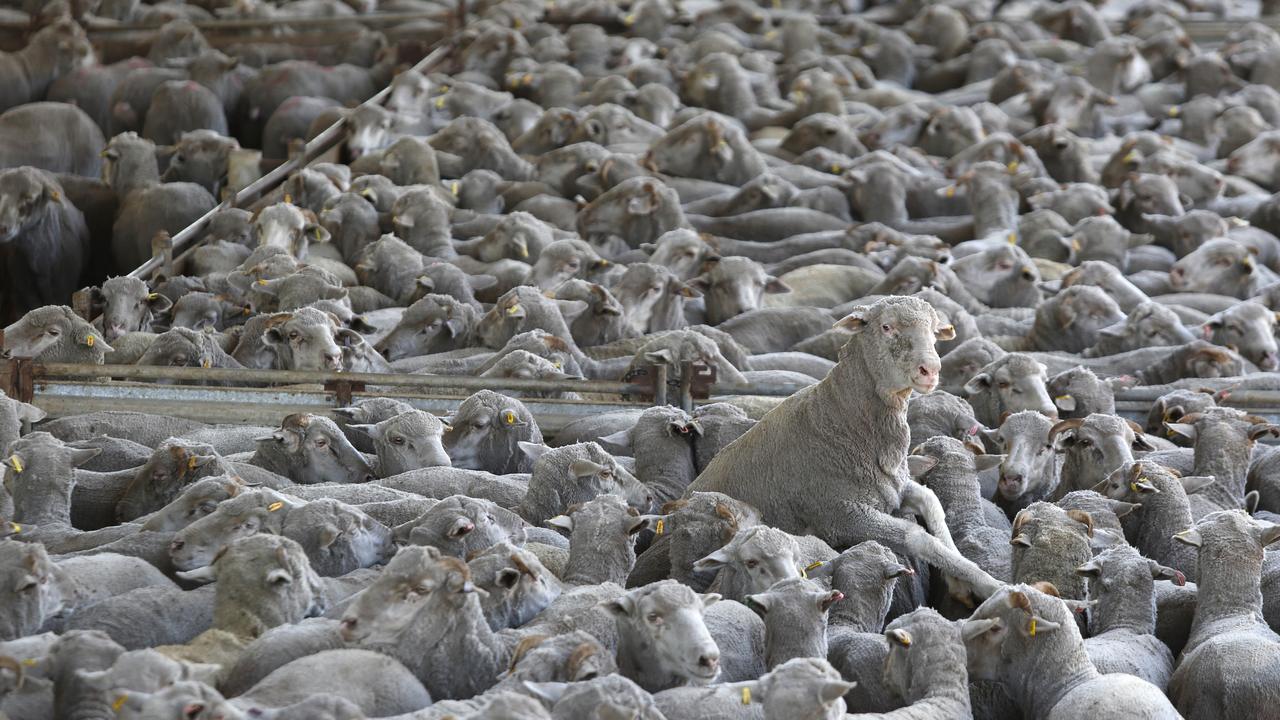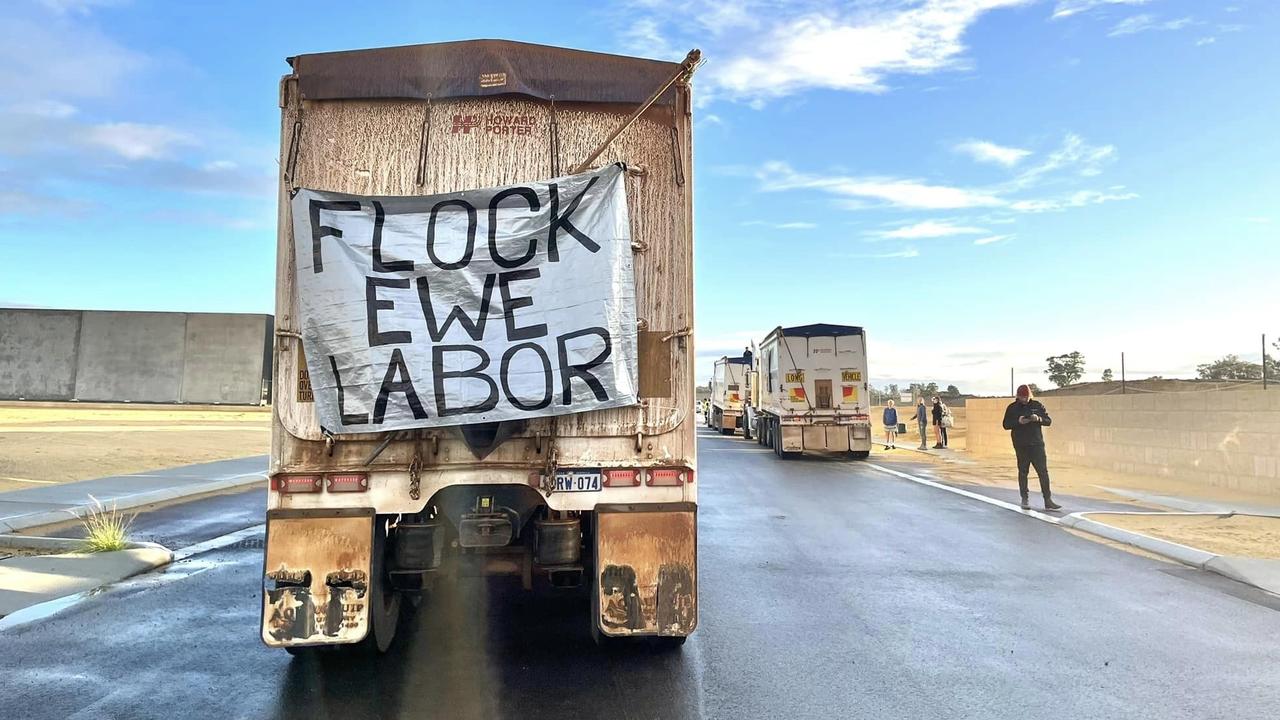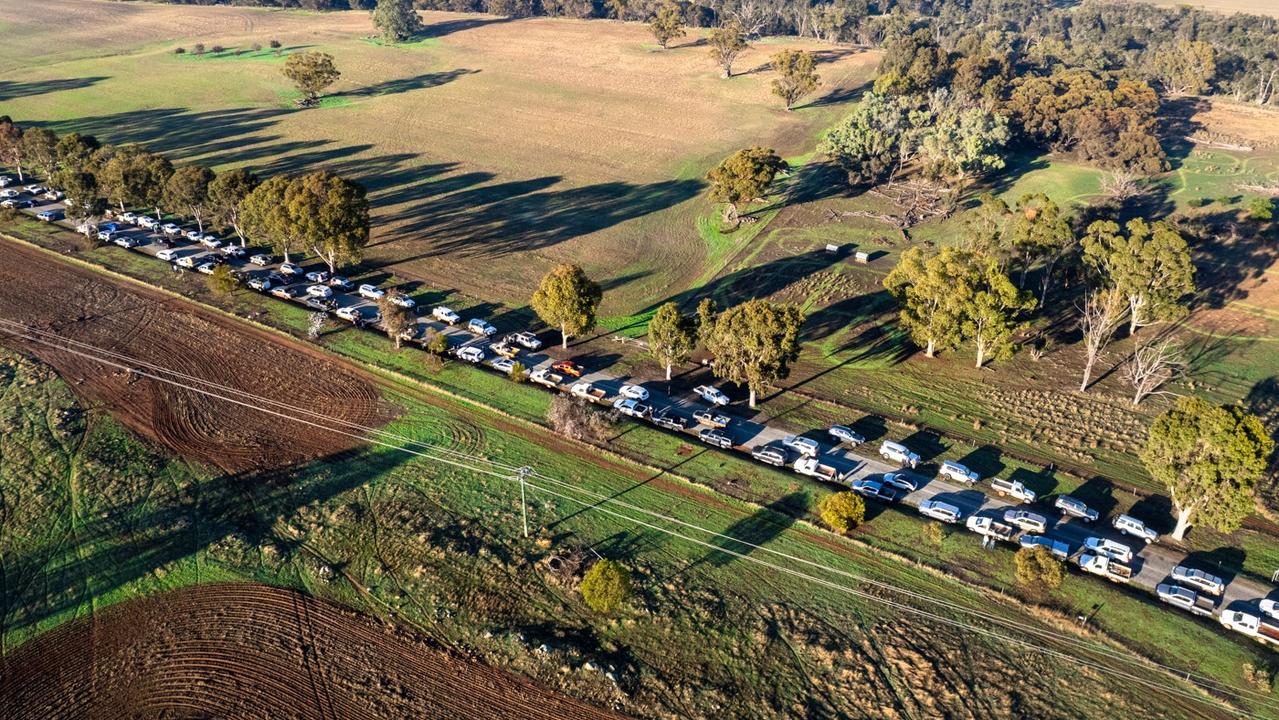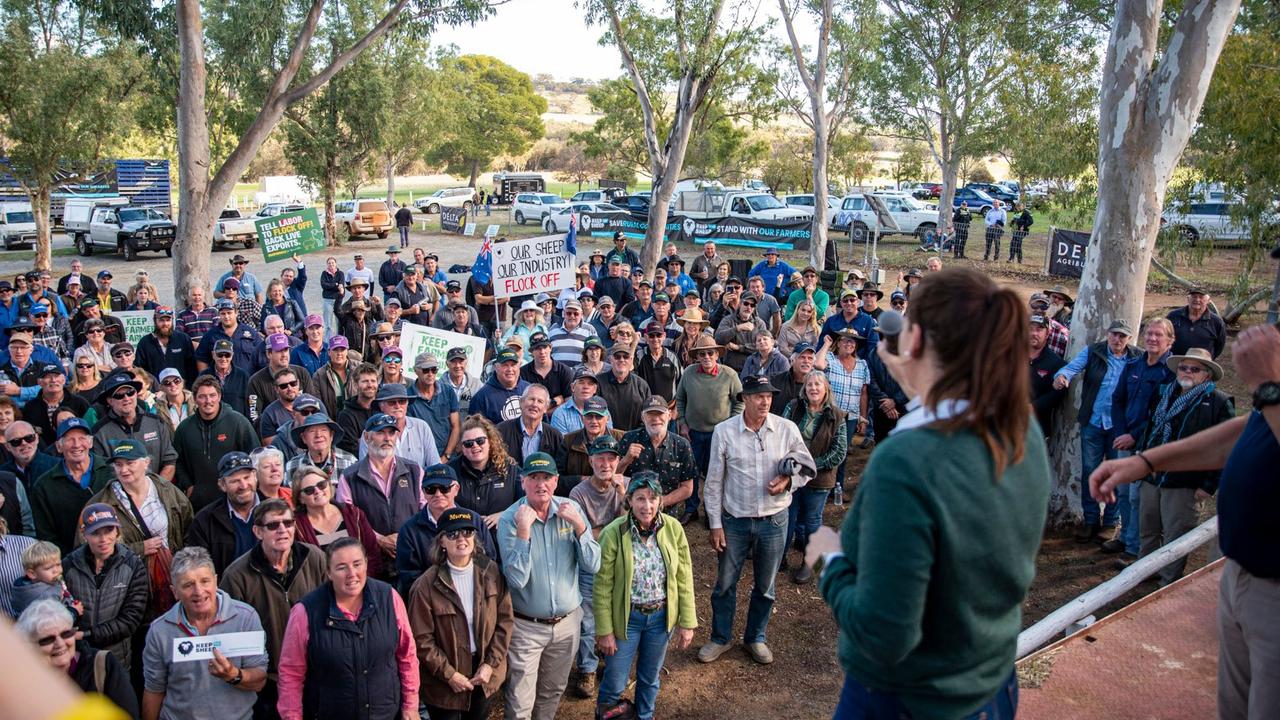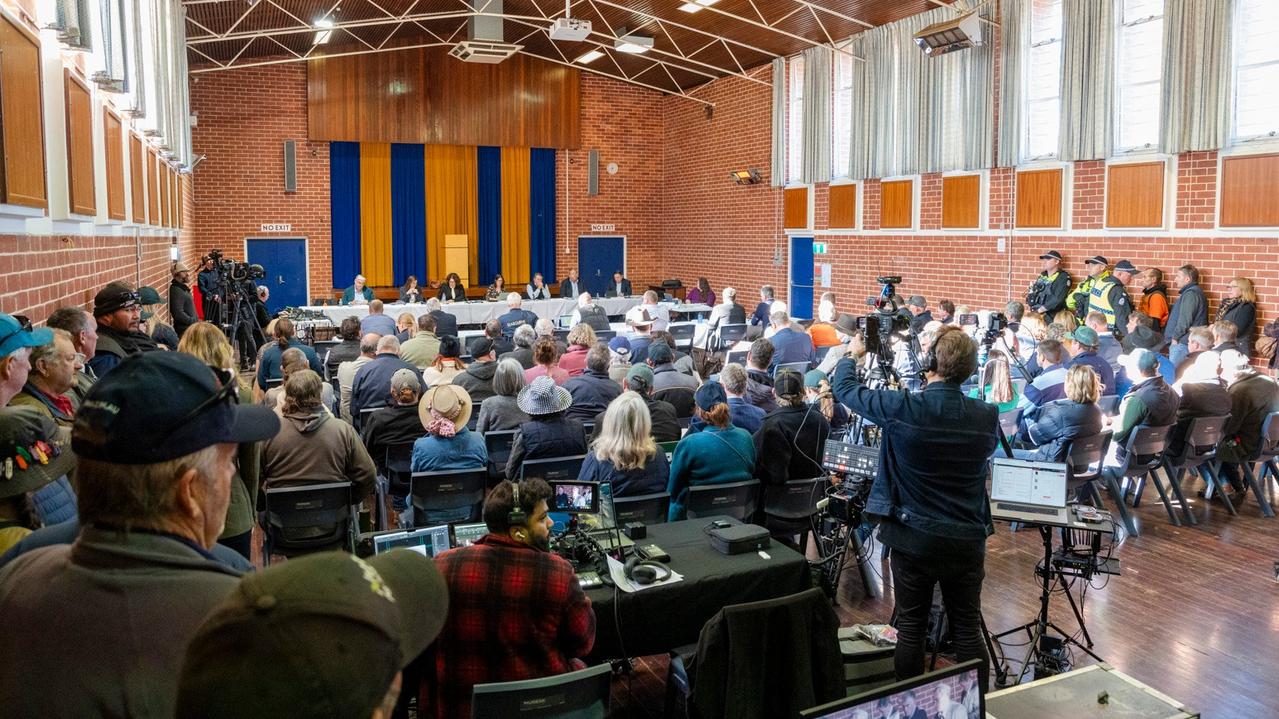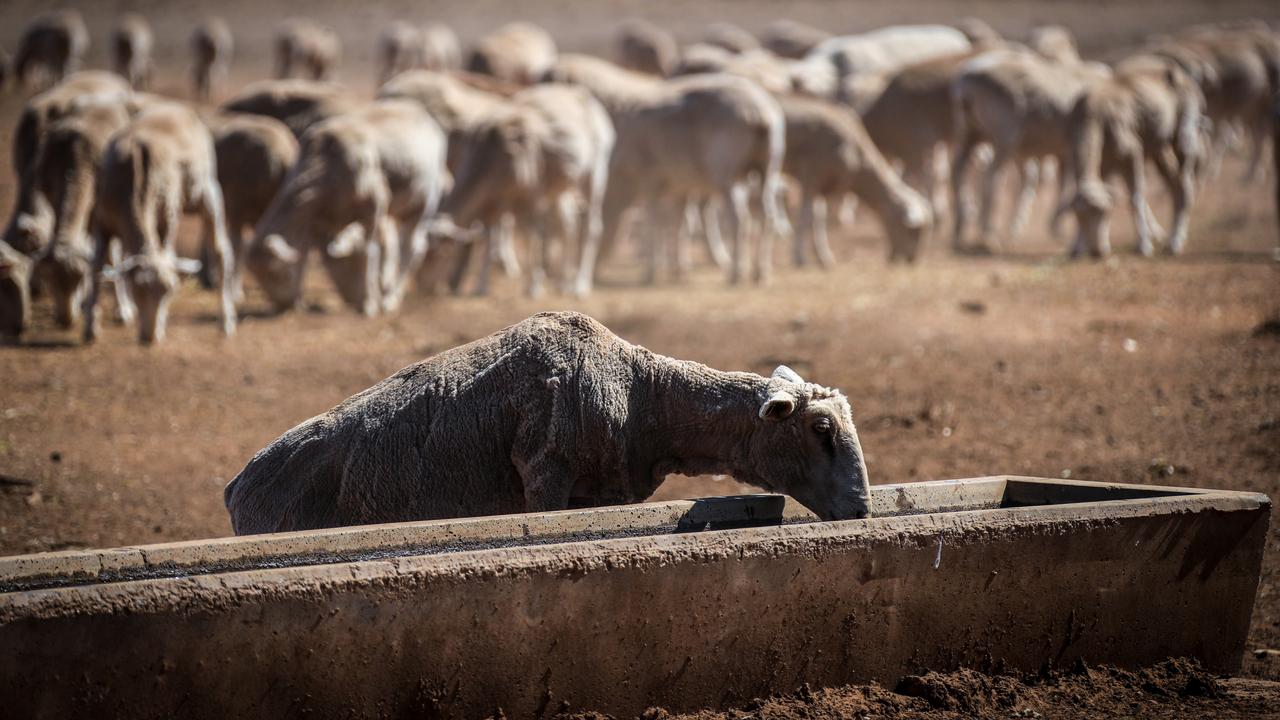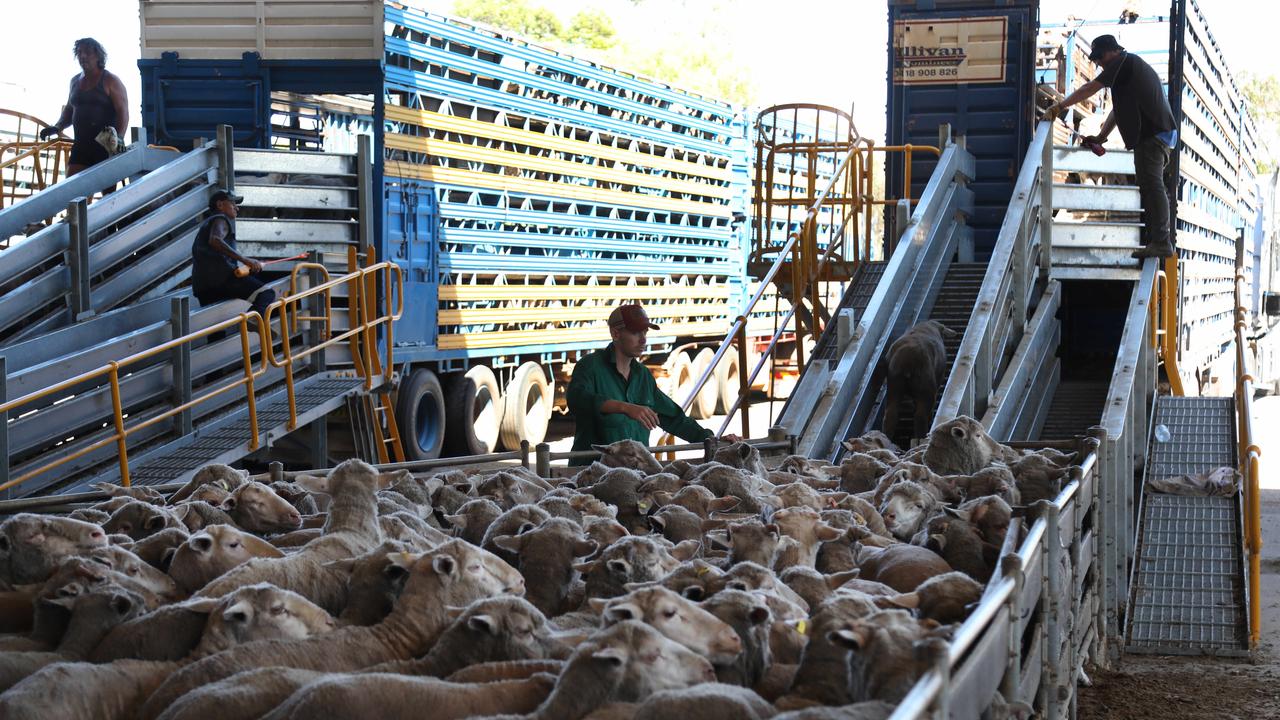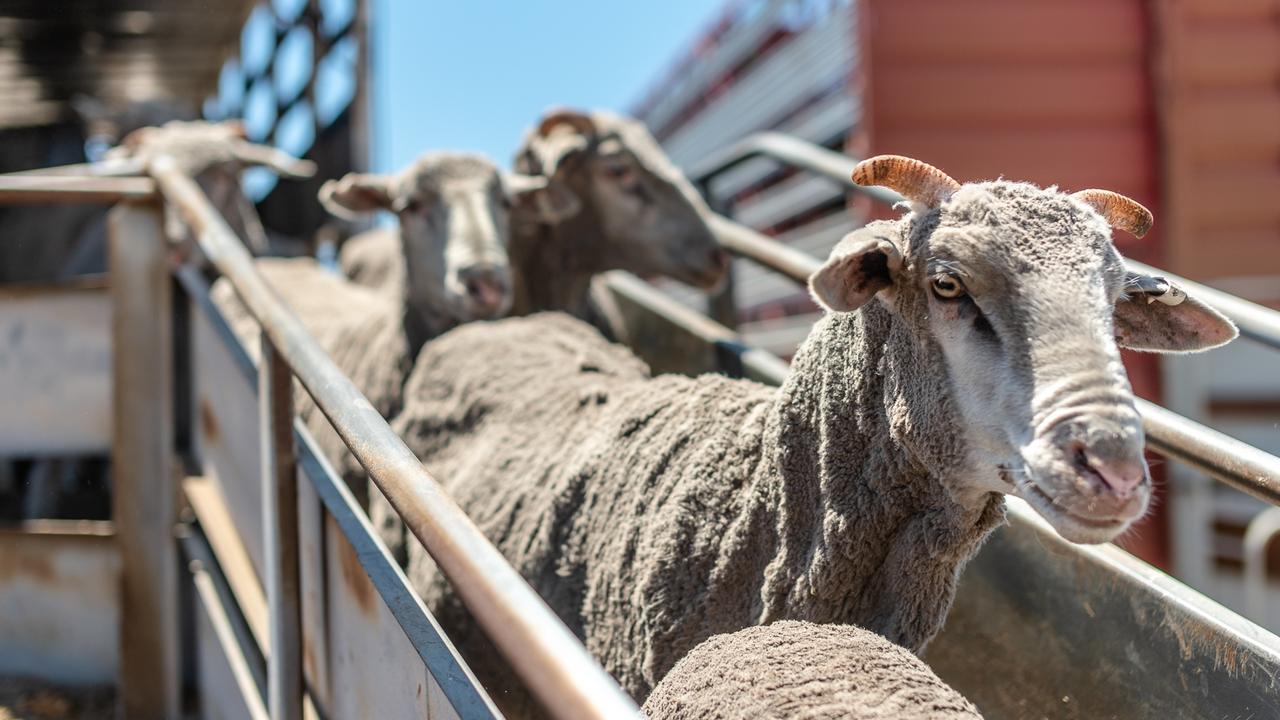A potential political movement is growing among Australian farmers as they work to overturn a ban on live exports before it comes into effect.
Meanwhile agriculturalists have given scathing assessments of the bill as they are given a say on the controversial legislation.
Over 56,000 members of the Australian farming community have signed a petition demanding the Albanese Government remove the ban, and thousands more are mobilising in person while lawmakers finalise the legislation.
The Export Control Amendment Bill 2024, otherwise known as the Ending Live Sheep Exports by Sea Bill or simply the ‘live export ban’, was presented to the public in May this year.
1st March 2023: Sheep in pins awaiting loading on trucks bound for port, for live export at Peel Feedlot, Mardella, WA. Picture: Philip Gostelow/The Australian
The Albanese government’s manifested election promise has been widely welcomed by many, including animal welfare advocates and heavyweight bodies like the RSPCA.
But farmers tasked with putting the bill into practice have thrown the latest punches.
The new legislation sets a definitive end date for the live sheep export industry from Australia, effective May 2028.
In May, a $107 million funding package was announced for a four-year transition to help farmers transition away from the sheep export industry following a pledge to end the practice amid animal welfare concerns.
The reaction from those directly and indirectly affected has been fierce, while the Albanese government and bodies in support argue the ban will bring a suite of local jobs and improved animal welfare standards.
Agriculture Minister Murray Watt argued that transitioning to processed lamb and mutton could meet the growing global demand for the products. Picture: NewsWire / Martin Ollman
Agriculture Minister Murray Watt argued that the flailing export sector could be refocused to feed Australia and the world’s growing appetite for processed lamb and mutton when unveiling the proposed bill.
“We all know Australians love their lamb, but now the rest of the world is catching on with demand for lamb and mutton products continuing to grow,” he said.
“Australia’s lamb and mutton exports were worth $4.5 billion in 2022-23 whereas live sheep exports by sea were less than $77 million in 2022-23, less than 0.1 per cent of Australia’s estimated agricultural production in that year.
There have been mass rallies, including a large protest in Perth’s CBD and a public hearing in Northam, against the planned cessation of the live export industry. Picture: Lara Jensen
“While live sheep exports have shrunk by $338 million over the past 20 years, our sheepmeat exports have grown by over 300 per cent over that same period, with exports to the North Africa and Middle East region more than tripling in value over this period.”
Pro-live export group presents a political threat
Farmers’ action group – Keep the Sheep – swiftly emerged in the wake of the announcement, tens of thousands.
It’s fast-growing petition demands live exporting of Australian sheep remains open for business.
“Farming communities have been crippled by the Albanese Government’s ban on sheep exports,” it reads, arguing that recent improvements that have made Australia a “world leader in animal welfare”.
“Our campaign is bigger than just politics, it’s about people’s lives and livelihoods,” the petition continued.
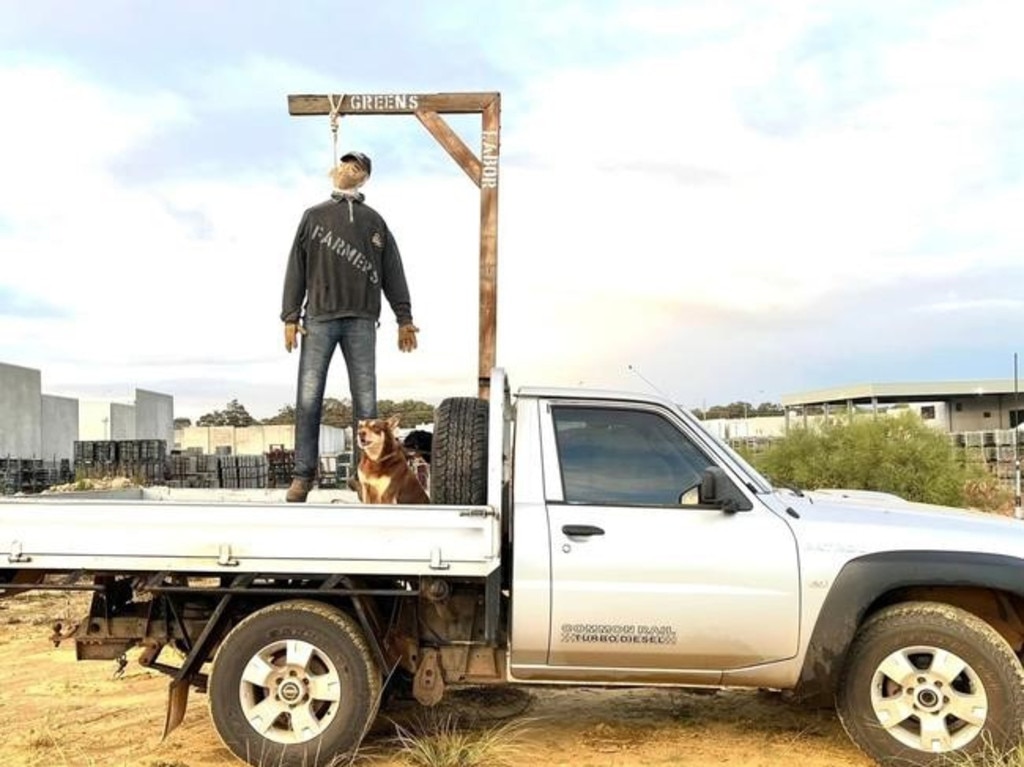
“The sheep industry has been the backbone of rural towns for over a hundred years and will soon disappear.”
In addition to signatures, which now exceed 56,000, Keep the Sheep has amassed significant financial backing that it hopes will “burst the Canberra Bubble”.
An update last week said a target of $500,000 will go towards targeting five marginal Labor seats in the next election. Already, almost $350,000 has been donated.
It’s not clear whether the group intends to run its own candidates.
News.com.au attempted to reach Keep the Sheep, but they did not respond by the time of publication.
‘Not dumb country hicks’: Single question enrages farmers
Keep the Sheep is already among a number of groups that have staged mass rallies, primarily in Western Australia.
On May 31, over a thousand trucks and farm vehicles set up shop in Perth’s CBD, causing disruptions and blaring their horns in unison as part of a large-scale protest against the planned cessation of the industry.
An inquiry into the bill was called on June 3, with two public hearings into legislation
On Friday, June 14, another large contingent of farmers were at it again, this time in the regional WA farming community of Northam, where a House of Representatives Standing Committee on Agriculture held a public hearing on the bill.
Reports suggest up to 2000 made their way to the public hearing from all over the state.
The crowd erupted on numerous occasions as key stakeholders and industry representatives defended welfare practices and vehemently lamented the new bill.
As many as 2000 farmers attended an inquiry into the live export ban last week. Picture: Josh Fernandes via the Keep the Sheep Facebook page.
“What the Government is asking us to do is put all of our eggs in the abattoir basket. We do not want to do that … It’s too much of a risk,” Sheep producer Steve McGuire from industry group WA Farmers said.
“Live export is a get out of jail card – it helps us manage risk.”
The option to live export is argued to offer farmers a chance to offload sheep before they are subjected to market uncertainties such as droughts.
Flipping the script, Labor member for Paterson and chair of the committee Meryl Swanson was quizzed by Mr McGuire if the Government were able to ensure ports and airfreight, trade relations and industrial action at abattoirs, and drought conditions would remain stable enough to facilitate the Government’s plan to transition to processed meat exports.
“You can’t guarantee that,” McGuire said as the packed hall erupted, answering his own rhetorical question.
A subsequent question from Ms Swanson caused the packed hall to erupt with laughter.
She asserted the industry was declining and asked how farming industry groups, like WA Farmers, are helping “pivot” businesses away from live exports.
Mr McGuire snapped back as the crowd continued to erupt, saying: “There are 1000 people out there, and they are not dumb country hicks who live in a vacuum.”
“This (question) comes from a position of complete arrogance for anyone to think that they can tell those people how to run their business,” he yelled.
“I cannot get over that question. Our job is to advocate for our members, and they told us to fight this — fight this like hell.
“When this Government was elected, we knew it was a policy, but we never thought the Albanese government would be stupid enough to go through with it.”
Ben Sutherland from the Livestock and Rural Transport Association argued, “Without live exports, we will not prosper.”
On Friday, June 14, 1000 people from the WA sheep farming community attended a House of Representatives Standing Committee on Agriculture inquiry on the live exports ban. Picture: Josh Fernandes via the Keep the Sheep Facebook page.
Industry members are concerned that the government’s bill would lead to adverse environmental and community impacts by encouraging the shift towards big cropping and commercial farming in sheep-grazing areas. Picture: Josh Fernandes via the Keep the Sheep Facebook page.
Tony Seabrook, president of the Pastoralists and Graziers Association of Western Australia added, “The only alternative we have if you have a minister who is not listening is to change the Government.”
“If he wants to bring it upon himself, well then, that’s fine because the mood outside here today is people are done with this Government,” Mr Seabrook said.
Much of the industry panel feared the bill would result in “big cropping” and “commercial farming” moving into areas currently used for sheep grazing — practices they claim negatively impact the environment and the way of life in regional communities.
Bill creates jobs and ends cruelty supporters, proponents argue
The RSPCA and animal welfare group Stop Live Exports made representations to the committee via teleconference towards the end of the public forum.
They welcome the bill and share concerns about the welfare of sheep when they are no longer in Australian jurisdictions.
Lisa Williams from Stop Live Exports said: “We are calling for a long overdue end to the cruelty associated with the trade.”
“(The bill) will not only end the well-documented, recorded and reported animal welfare issues, including deaths that have occurred on the long truck journeys and sheep ships such as the recent MV Bahijah incident and Awassi Express disaster,” she argued.
Animal welfare groups and stakeholders support a bill to end live sheep exports from Australia due to concerns about animal cruelty and welfare issues, including deaths during transportation.
Animal cruelty charges against shipper Emanuel Exports, related to the deaths of over 2000 sheep due to heat stress aboard the Awassi Express in 2017, were dropped late last year as prosecutors decided it was no longer in the public interest to proceed.
More recently, thousands of Australian sheep and cattle were confined for over five weeks on the MV Bahijah due to safety concerns in the Red Sea after departing from Fremantle in early January.
The livestock were successfully re-exported to Israel in early March after being quarantined in Perth, but not without intense protests from animal rights groups.
In her representation to the standing committee in Northam, Ms Williams argued: “(The ban) will also prevent Australian animals from being slaughtered while fully conscious in the importing countries … something Australians would not allow to happen here.”
Both stakeholders in support of the bill highlighted potential employment opportunities with increased slaughtering and sheepmeat processing within Australia.
The proposed ban on live sheep exports is expected to create employment opportunities in sheepmeat processing within Australia, as well as lead to a potential boom in the sheepmeat industry. Picture: Philip Gostelow/The Australian
“We’re aware there is a whole industry at stake, but we know there is support in place for those industries,” Ms Williams said.
The government had echoed similar projected outcomes.
In explaining the bill upon its release, the government said the demand for processed sheepmeat here and overseas has rapidly expanded, citing the disputed figures that the export market is failing.
And with processing onshore in Western Australia given a shot in the arm, the government expects a jobs boom.
“Our sheepmeat industry is one of the great success stories of our agricultural sector,” Minister Watt said upon the bill’s announcement.
“Processing sheep here in Australia adds value locally, supports increased farm gate returns and creates local jobs.”
At the first inquiry, held in Canberra on June 12, an Australian Veterinary Association representative acknowledged that welfare conditions had improved, but an unacceptable number of animals still experienced health issues in the live exporting process.
“We’re still seeing unacceptable rates of heat stress, gastrointestinal diseases … there are welfare issues that remain, and they remain of concern,” Dr Melanie Latter told the inquiry, as reported by The Guardian.
While the ban has strong support from animal welfare activists, there are concerns that it may lead to increased exports from countries with lower welfare standards. Pictures: Supplied
Alan Renwick, Professor of Agricultural Economics at New Zealand’s Lincoln University unpacked the proposed bill last month in The Conversation.
New Zealand imposed a total ban on live animal exports, which is now in full effect.
According to Prof Renwick, the industry faces several risks, including economic losses and a significant impact on Western Australia’s entire sheep sector, which heavily relies on live exports.
He noted concerns that “even small reductions in revenue could push some businesses and their owners past a tipping point” due to existing financial and climatic challenges.
The Standing Committee on Agriculture is expected to produce an advisory report off the back of the inquiry later this month.
Source: https://www.news.com.au/

